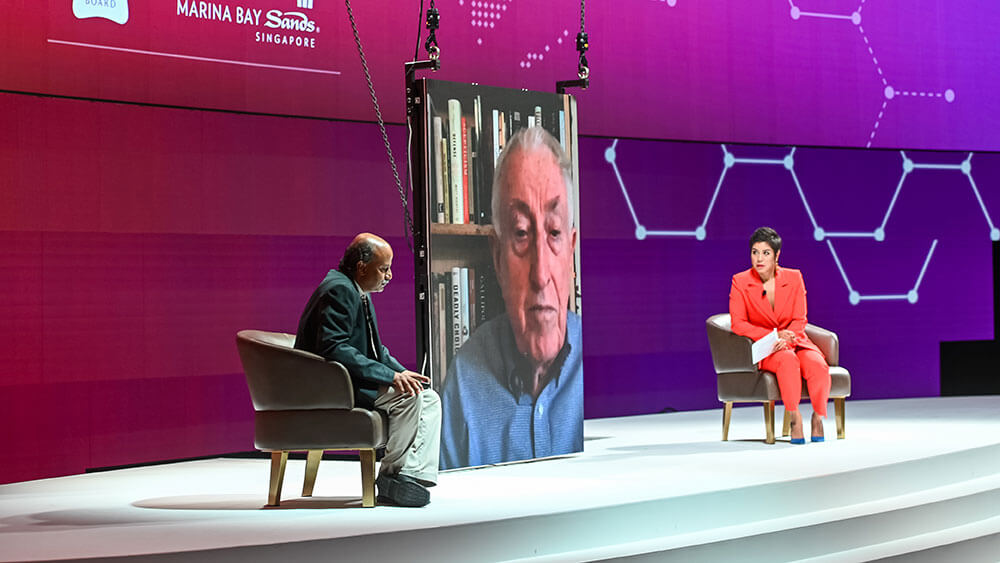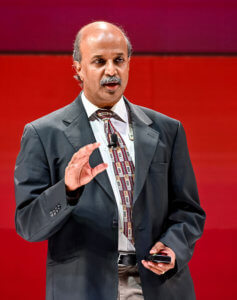
Infectious disease experts Dr. Paul Ananth Tambyah (left) and Peter C. Doherty (on screen) discuss the COVID-19 pandemic and vaccines with emcee Nikki Muller from the Global Broadcast Center powered by Singapore Tourism Board and Marina Bay Sands. (Syafiq AB photo)
FIND THE SESSION: We Have the Vaccines. Are We Back to Normal Yet?
In the Convening Leaders session, “We Have Vaccines. Are We Back to Normal Yet?,” Dr. Paul Ananth Tambyah, the first Singaporean to be elected president of the International Society of Infectious Diseases (ISID), and Nobel Medicine Prize Winner Peter C. Doherty, Ph.D. share the (virtual) stage in Singapore and discuss the latest developments in the COVID-19 vaccine rollout and its potential effects on travel and business events. The session was recorded Wednesday from the stage of the Global Broadcast Center powered by Singapore Tourism Board and Marina Bay Sands. It will be broadcast for the virtual Convening Leaders audience at 10:30 a.m. EST Friday, Jan. 15. Convene interviewed both doctors before the event.
Dr. Paul Ananth Tambyah
Singapore-based Tambyah currently serves as professor of medicine at the National University of Singapore and senior consultant for National University Hospital’s infectious diseases division, as well as chairman of the Singapore Democratic Party. The below interview was conducted over e-mail.
In the hospitality industry, we’ve seen a huge focus on hygiene and sanitation, which is important, but less so than ventilation it seems. Can you share your thoughts on if hotels, venues, airlines, and others are doing enough in this arena, and if not, what should they be doing?
Tambyah: Very few infectious diseases have been proven to be airborne – these are primarily tuberculosis, measles, and chicken pox. The evidence for airborne transmission of SARS CoV2 except in special situations which involve aerosol generating procedures such as intubation in hospitals, is very, very thin. I know that there is a powerful group of engineers who have argued about the possible airborne transmission of the virus, but this seems more theoretical than really evidence based.
There is only one study which found viable virus in the air in the setting of a person with COVID-19 disease, and that individual was not shedding virus, so it is not clear where the virus came from. There was also a very unusual experiment which showed that when a high-powered jet was used to blow large concentrations of virus into a special chamber, the virus could linger in aerosols.

Infectious disease expert Dr. Paul Ananth Tambyah speaks during his presentation. (Syafiq AB photo)
Apart from that, researchers in Singapore and elsewhere have simply not been able to find viable virus in the air samples they have obtained. If the virus were truly airborne, we would expect many times more people to be infected at all the major clusters we have seen all over the world. That happens with measles, which together with smallpox (another airborne virus), wiped out the population of the Americas soon after Columbus arrived.
Instead, the number of people infected from each case of COVID-19 tends to be relatively low except in unusual super-spreading events. Also, if the virus were airborne, wearing medical masks (as in most countries with mandates such as Singapore) would be pointless as N95 respirators or higher would be needed to prevent airborne transmission. As such, most ventilation systems that meet modern standards should be fine. Venues should spend the time and effort and money designing better workflows to reduce overcrowding (to reduce contact and droplet transmission) and screen out people who are not well from entering with appropriate referrals to medical care as needed.
Editor’s note: The CDC, along with many experts, have acknowledged that airborne transmission plays a role in the spread of COVID-19. The EPA also has issued guidance on how to reduce the potential for airborne transmission of COVID-19.
It may be too early to know, but in your opinion, what degree of vaccination would make a very large indoor gathering (thousands of people) “safe”? Right now, we know that a small percentage of the population can’t receive the vaccination — and a growing number of people, it seems, simply won’t take it. Can someone who is organizing a 10,000-person indoor trade show still feel confident if a few hundred of those attendees aren’t vaccinated, for example? Or should the organizer simply not allow unvaccinated persons at the event?
Tambyah: I would think that the simplest thing to do is simply bar anyone who does not have evidence of vaccination unless they have a really good reason and are wiling to wear protective equipment (to protect others rather than themselves). The world’s largest annual events are the Haj and Umrah pilgrimages in the Kingdom of Saudi Arabia and for decades, they have mandated various vaccinations including meningococcal vaccination, lately influenza vaccination, and even yellow fever and polio vaccination from countries where these viruses are circulating. This approach has worked very well with almost none of these diseases reported in countries with very good medical surveillance systems in Europe and North America who send travelers to the Kingdom every year.
If you were in charge of organizing an in-person event to take place later this year, and all attendees were vaccinated, would you still mandate precautionary measures (masks, testing, etc.)? If so, what and why?
Tambyah: I know it sounds like a cop out but right now, I would say that it depends. If the vaccines work as promised and we see zero cases in countries with large proportions of their population vaccinated, such as Israel or Bahrein; or significant declines in the U.S. and U.K., which started vaccinating early, then I think it would be reasonable to get rid of all the other measures.
That is what happened with the Salk polio vaccine in the U.S. and the Sabin [vaccine] in Singapore and other countries in the 1950s and 1960s. When the vaccines were found to be so effective in real-life use, all other measures such as school closures, public swimming pool closures, etc. were lifted. If on the other hand, the vaccines only make a small dent on the numbers of cases, hospitalizations, and deaths from COVID-19, then I definitely think that the other measures need to remain. So, it all depends on the data coming out of the countries (36 at last count) which have rolled out vaccine programs.
I think many of us are wondering when international travel will go back to normal. Because it’s not certain yet that the vaccines will prevent transmission, it still seems like a big risk to travel to another country and potentially spread the disease — especially if it’s a place where the vaccine might not accessible yet to its citizens. What are your thoughts on this? Do you think that in addition to immunity passports/vaccination cards, precautions like testing and masks should remain for a while?
Tambyah: I think that travel is likely to go back to near normal probably by Q3 2021 when the numbers have dropped for a considerable period of time and we have not seen a resurgence of cases in South America or Australasia during their winter 2021. That, of course, is conditional largely on the vaccines working — and has to be tempered by the fact that I am an optimist!
Unfortunately, I think that we will probably have a relatively narrow window of maybe a year or so before the next pandemic, which is likely to be influenza, and it will be a huge challenge since the conventional wisdom dominating the narrative of this pandemic is that we have to lock everything down and ban global travel whenever a new virus which kills vulnerable people appears. Of course, COVID-19 vaccination and immunity passports will be useless against a novel strain of influenza but hopefully we will be able to come up with a new safe and effective flu vaccine very quickly, a lot faster and better than we did in 2009 with the H1N1 pandemic.
Can you share an event or conference you’re looking forward to attending in-person (when you’re able to safely)? What about it is special/worth attending live to you?
Tambyah: There are two — one is the Decennial Congress on Healthcare Associated Infections, which is held every 10 years. It was scheduled for March 2020 in Atlanta and I was on the program committee with a bunch of U.S. CDC people and experts from around the globe. It is a unique meeting which sets the agenda for my primary field of research (health-care associated infections) for the next decade. It is a great opportunity to interact with people in the field (both leaders and ordinary practitioners), and a lot more goes on outside the formal sessions or in the lively debates and Q&A sessions that cannot really be replicated online.
The other is the International Congress on Infectious Diseases organized by ISID, which was scheduled to be held in Kuala Lumpur. This is a truly unique meeting with researchers from all over the world coming together to share data, lessons learned, and to interact. It is always a good time to meet up with colleagues and collaborators from low- and middle-income countries who may not have the resources to access many online meetings or fora.

Peter C. Doherty, Ph.D., discussed developments in the COVID-19 vaccine rollout during a Convening Leaders session to be broadcast Friday.
Peter C. Doherty, Ph.D.
Last week, Convene spoke with Peter C. Doherty, Ph.D. over Skype. In 1996, Doherty won the Nobel Medicine Prize for his research on how T-cells recognize virus-ridden cells — an important discovery for the development of vaccines and treatments. He is the patron of the Peter Doherty Institute for Infection and Immunity in Melbourne, Australia, and Nobel laureate professor at St. Jude Children’s Research Hospital in Memphis. He has also authored several books, including The Beginner’s Guide to Winning the Nobel Prize and The Knowledge Wars.
What are your thoughts on the new variants that have appeared in the last few weeks?
Doherty: The new strains that we’ve been seeing so far are what we call “drifting” a bit — that is, changing the site that the antibodies, the vaccines, stimulates. They haven’t changed to an extent where the vaccines won’t work, but there’s always a concern. [COVID-19] doesn’t change quickly like the flu, where we have to have a new vaccine every year because the virus changes so fast. It’s a much bigger virus and it’s got what we call better proofreading built into it. Flu viruses and the HIV virus have no proofreading mechanism. So, it’s not changing that fast, but it could change in a way that the vaccine won’t work. And that would mean that the vaccine industry has to be really quick to pivot and get out a new vaccine.
The main job now is to try and get as many people vaccinated as quickly as possible so you can get the level of transmission down. I think the problem is that people have been influenced by the anti-vaccine propaganda. They don’t realize that there’s always some risk with any medical procedure, but [getting infected with COVID-19] is infinitely more dangerous and people don’t understand infection. So that’s what I’m trying to explain in the articles that I’m writing. At the moment, I’m putting them together for a book that’s going to be sent to the publisher at the end of the month.
You’ve spent decades researching immunology. What has been going through your mind this past year as you’ve watched this pandemic play out?
Doherty: I wrote a book on pandemics in 2013 (Pandemics: What Everyone Needs to Know) where I said a severe influenza pandemic would cost the world trillions and trillions of dollars, and that we would [rely on] the Internet and food delivery, but I had no real idea of how that would play out. It’s played out better in countries that have provided financial support for people who have lost their jobs.
What are your thoughts on immunity passports or proof of vaccinations for international travel? Do you think it should be a requirement?
Doherty: If I were running an airline, I would be aggressively requiring — once vaccines become universally available — that passengers show evidence of vaccination. Immunity passports would apply to people who’ve had the infection, but the problem with the immunity passports is the variability of a lot of the antibody tests.
What’s your view on attending an in-person event right now?
Doherty: I think, on one level or another, we’ve got at least another year or two of this — in a way. From my personal perspective, I just turned 80, and [prior to the pandemic] we were still traveling an enormous amount. But if I’m asked to speak at a conference, unless it’s something I really want to go to, I’m not flying. I’m willing to do a remote talk or be interviewed via Zoom.
What do you think about hosting a large in-person event, should organizers only allow attendees who are vaccinated?
Doherty: For those who refuse [or can’t] receive the vaccination, it should be participation by remote means. I think it depends on the level of virus that is circulating in the community. If the virus is not circulating, it’s different matter. But you don’t want situations where it is circulating, and you have a meeting of 1,000 people from all over … and the virus comes back again. It’s a difficult situation.
I know you have a deep love for travel, in fact you wrote a book about it, “The Incidental Tourist” — can you share your favorite travel destinations?
Doherty: When we go to St. Jude, which I still do a couple of times a year, we stay at the River Inn, right on the Mississippi. You look out the door and you can see the Mississippi River. I wrote about some of these [places] in my book [The Incidental Tourist]. One of the most wonderful trips we had was when we spent about four or five days in Bergamo, Italy — a medieval town, a glorious place. London, New York for different reasons, Seattle — our son lives there. I like Boston. And the Carolinas, the Outer Banks. Fantastic!
Jennifer N. Dienst is managing editor at Convene. This interview has been edited and condensed for length.
